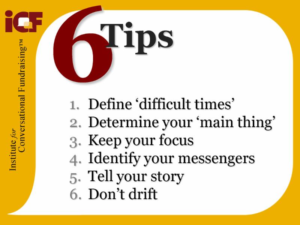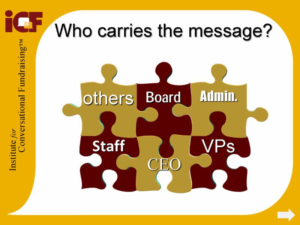 For the last couple of weeks, I’ve been discussing some tips from a seminar called “Mission, Money, & Management: Keeping Boards and Donors Connected in Difficult Times.”
For the last couple of weeks, I’ve been discussing some tips from a seminar called “Mission, Money, & Management: Keeping Boards and Donors Connected in Difficult Times.”
This week’s tip are all about story. I love stories. If you’ve spent any time with me, you know that I enjoy a powerful story and the way it can connect with people. But sometimes we forget that our organization is also telling a story. This means we want to be careful to know what kind of story we’re telling, and if anyone is paying attention.
First, Tip 4: let’s identify our messengers, or the story-tellers. Right away you’re probably thinking of your colleagues who work in the public relations office or who deal with the media on a regular basis. You’re right; they are part of the story-telling process.
But they’re not alone. Everyone who works to make your mission a reality is a messenger of your story. In fact, sometimes the messengers who aren’t in PR are the most important ones!
 Your story is told in one way or another, by the CEO, the office manager, the receptionist, and by everyone on every level in between. Those formal channels, like public relations and social media, matter. But they matter most IF they are just providing consistency for the informal messengers within your organization.
Your story is told in one way or another, by the CEO, the office manager, the receptionist, and by everyone on every level in between. Those formal channels, like public relations and social media, matter. But they matter most IF they are just providing consistency for the informal messengers within your organization.
Tip 5 is simple – Tell Your Story. But be sure you’re telling the story in a way that gets the attention of your audience.
So what’s the best way to tell your story? Put a face on your mission. Tell the story through the eyes of one person who has benefited. Tell a success story of how your organization helped that one person.
 Then go broader. You have had great success, but there are still those who are in need. Too many times we tell stories that go from the many to the one. Those aren’t as effective and can leave your audience feeling lost.
Then go broader. You have had great success, but there are still those who are in need. Too many times we tell stories that go from the many to the one. Those aren’t as effective and can leave your audience feeling lost.
My friend, John Millen, is a spectacular story-teller. He allowed me to partner with him to create a program we’re both excited about, called “Storytelling for Analytical Leaders.” This workshop is a powerful way to equip people to tell their story in a way that can really make a difference.
So, what’s your story?
Your friend,
Kent Stroman,
America’s ASKing Coach





 [caldera_form id="CF591c6f3f5221c"]
[caldera_form id="CF591c6f3f5221c"]
